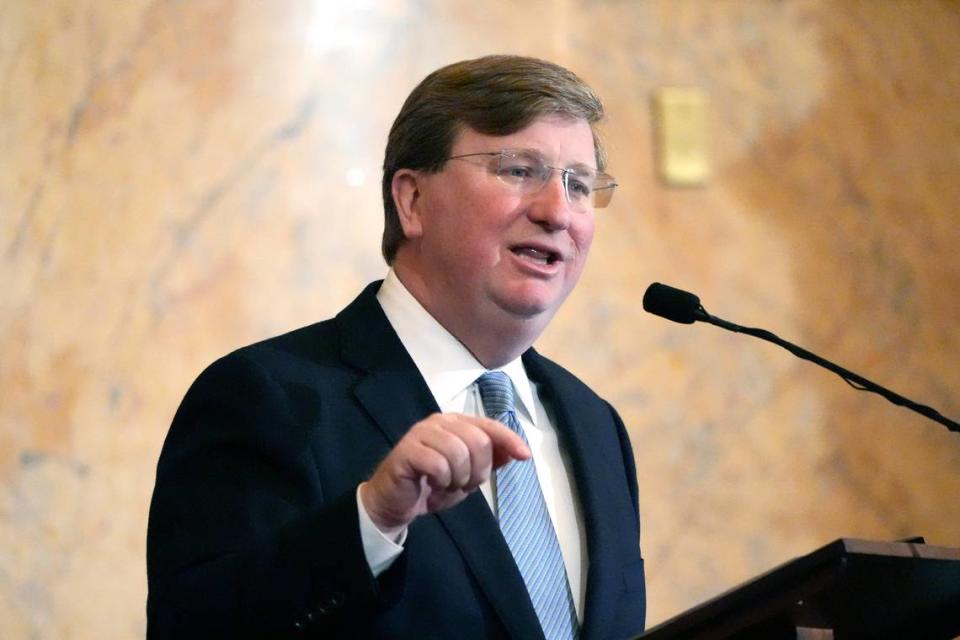At long last, some Mississippi politicians may be moving past name-calling in health care
- Oops!Something went wrong.Please try again later.
- Oops!Something went wrong.Please try again later.
- Oops!Something went wrong.Please try again later.
Riding around curvy roads in northeast Mississippi campaigning for reelection in 2007, Republican Gov. Haley Barbour unveiled to a reporter his plan to create a state exchange where individuals and businesses could shop for health insurance at a lower rate.
The federal Patient Protection and Affordable Care Act passed in 2010 had a feature strikingly similar to what Barbour proposed, which coincidentally already was being used in Massachusetts. The ACA gave states the option to piggyback off the federal exchange to create their own exchange. The federal subsidies offered through the ACA would be available to individuals purchasing insurance off the federal or a state exchange.
Barbour wanted to create a state exchange that would include features from the proposal he offered during his 2007 reelection campaign. State Insurance Commissioner Mike Chaney also strongly supported a state exchange, saying his office would have more authority to shape a state exchange to fit the needs of Mississippians. But the ACA had by then morphed into “Obamacare,” which was meant to be a derisive term, and many Mississippi legislators, and then-Lt. Gov. Phil Bryant, were opposed to being associated with any part of the landmark national health care law touted and proposed by then-President Barack Obama.
In the end, there was no state exchange set up in Mississippi, though it could be argued that the national exchange has been a success in the state. About 270,000 Mississippians currently have insurance policies purchased off the national exchange.
Yet for 13 years now, most Mississippi politicians have continually demonized “Obamacare” and anything associated with the national law.
They blocked Medicaid expansion that would provide health care for primarily the working poor in Mississippi, and they rejected a state-run exchange. And along the way, Medicaid expansion and Obamacare became dirty words in the minds of many Mississippi politicians.
That demonization might be ending. On the same day in the Mississippi House last week, members by an overwhelming 98-20 margin voted to expand Medicaid. Soon after that vote, House Ways and Means Chair Trey Lamar, R-Senatobia, offered a bill, which passed 112-5, to create a statewide exchange.
Under the bill, Mississippians will go to the state exchange to purchase their insurance policy, but importantly, the federal subsidies still will be available. Lamar is hoping by offering state tax incentives to private insurance companies to join the exchange that there will be more choices for Mississippians shopping for health care coverage. And he is hoping that by providing tax incentives to health care providers who accept patients who have exchange insurance coverage, that more of them will do so.
Hello, Haley Barbour and Mike Chaney from 2012.
During the debate of the two bills in the House, no one uttered the word Obamacare. And in general, fewer and fewer Mississippi politicians are saying Obamacare in a derisive manner, though many go out of the way not to say the phrase Medicaid expansion when they are talking about — gulp — expanding Medicaid.

One politician, of course, continues to proudly and derisively use the term Obamacare. When arguing against expanding Medicaid, Republican Gov. Tate Reeves recently reposted a social media comment from former President Donald Trump proclaiming: “Obamacare sucks!!!”
When explaining the bill to expand Medicaid to fellow House members, Missy McGee, R-Hattiesburg, did not talk about Obamacare. Instead, she talked about the fact that Mississippi has many of the nation’s worst health care outcomes.
Mississippi has among the highest rates of infant mortality, diabetes deaths, cardio disease death — and the list goes on.
The bottom line is Mississippians have the shortest life expectancy in the nation.
In terms of action by legislators to address those bad outcomes, she said, “‘No’ is not a policy that has helped.”
Before this session is over, Reeves may have to decide whether he wants to continue the demonization of Obamacare or sign into law Medicaid expansion in an effort to address those poor health care outcomes. There is a strong possibility the bill also will pass the Senate and reach his desk, where he must decide whether to sign it or veto it or allow it to become law without his signature.
If so, Reeves will not be the first Mississippi governor to face some difficult decisions surrounding Medicaid.
In 1969, then-Gov. John Bell Williams, who had voted against creating the original Medicaid program when he was in the U.S. House in 1964 and who had railed against it, called a special session to ask legislators to opt into the Medicaid program. Williams said the fact he opposed the program should not keep lawmakers from embracing a federal program that would help Mississippians.
This analysis was produced by Mississippi Today, a nonprofit news organization that covers state government, public policy, politics and culture. Bobby Harrison is Mississippi Today’s senior Capitol reporter.

